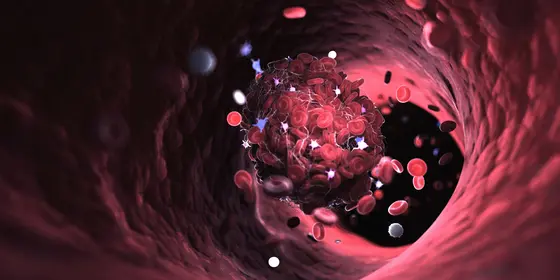In the Heidelberg cohort of the European Prospective Investigation into Cancer and Nutrition (EPIC-Heidelberg), the scientists examined whether prediagnostic coagulation markers can be used to predict the risk of lung cancer. To do so, they determined the level of various factors involved in coagulation, including fibrinogen, soluble glycoproteins, and soluble P-selectin.
These characteristic coagulation proteins were determined in initial blood samples of 2,480 EPIC participants. The coagulation factor concentrations of 190 EPIC study subjects who developed lung cancer in the course of the follow-up period of the EPIC study were then compared with these initial values.
“Our work showed a significant association between higher blood concentrations of both fibrinogen and soluble P-selectin long before manifestation of the disease and a higher risk of lung cancer,“ lead author Mirja Grafetstätter explained, summarizing the main finding of the study. “This is the first indication that increased coagulation activity not only promotes existing lung cancer, but may also be involved in carcinogenesis. A causal relationship still needs to be verified in further studies, however.“
“This is the first time that a prospective study has supported the hypothesis that thrombophilia may promote the genesis of lung cancer,“ remarked principal investigator Tilman Kühn. The clearest relationship between cancer risk and blood coagulation was demonstrated for two blood coagulation cascade proteins, fibrinogen and soluble P-selectin. However, whether the concentrations of the two proteins can be used in future as a prediagnostic marker of individual lung cancer risk cannot be established until the current results have been verified by independent studies.
Fibrinogen is a coagulation factor that triggers activation of the blood platelets and their subsequent clotting. P-selectin is an important surface molecule expressed by endothelial cells and activated blood platelets; it mediates interaction between platelets and tumor cells and plays a particular role in metastasis, among other things.
The work was supported by third-party funding from the World Cancer Research Fund and the German Center for Lung Research (DZL).
Mirja Grafetstätter, Anika Häusing, Sandra Gonzalez Maldonado, Disorn Sookthai, Theron Johnson, Laura Pletsch-Borba, Verena A. Katzke, Michael Hoffmeister, Peter Bugert, Rudolf Kaaks, and Tilman Kühn: Plasma Fibrinogen and sP-Selectin are Associated with the Risk of Lung Cancer in a Prospective Study.
Cancer Epidemiol Biomarkers Prev. 2019, DOI: 10.1158/1055-9965.EPI-18-1285
